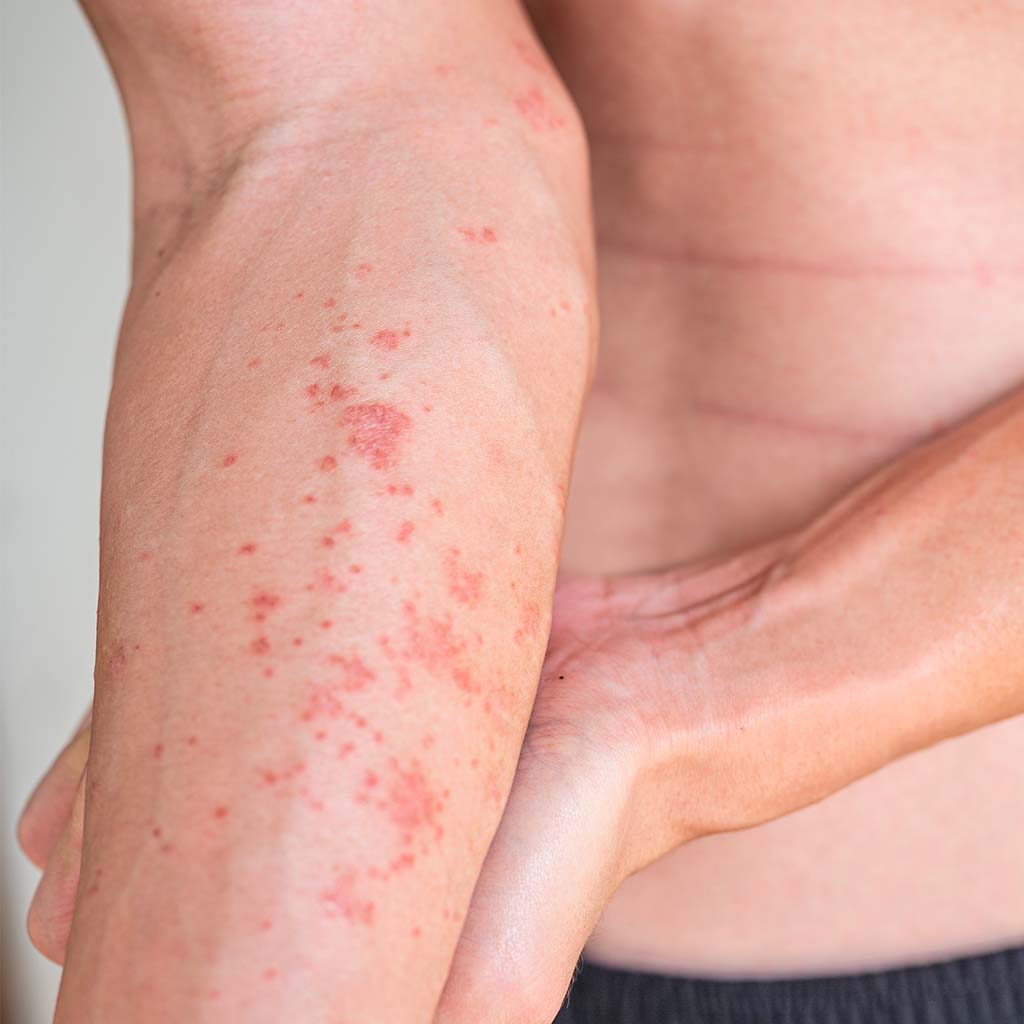Eczema: how to recognize and treat it

出版日期: 15-05-2023
更新日期: 15-05-2023
主题: 皮肤科
预计阅读时间: 1 分钟

医学编辑
Bruno Bianchi
编辑和译员
Viktoryia LuhakovaEczema is an inflammatory skin manifestation characterized by crusty redness and scaling and a rather prominent itchy component. Itching, in fact, is the most bothersome symptom of eczema and can occur with different intensity (acute, sub-acute, chronic) depending on the underlying disease. In itself, eczema is not a serious condition, but it can create discomfort in both the social and occupational spheres.
Dr. Bruno Bianchi, head of the Dermatology Outpatient Clinic at Istituto Clinico Villa Aprica in Como and a dermatologist at Palazzo della Salute - Wellness Clinic, gives an overview of the condition, explaining how to diagnose it quickly and how to treat it effectively.
Types of eczema
"Eczema dermatitis can be of different types:
- atopic dermatitis: affects children aged 0 to 10 years and is probably related to a genetic predisposition to develop allergies with itchy inflammatory areas typically located in the crook of the knees and elbows. Atopic dermatitis may manifest a reduction in symptoms (itchiness and skin dryness) in 80% of cases by the time of puberty, but may also persist into adulthood with a flare-up phase or blurred or absent disease;
- irritative forms: these are due, for example, to excessive hand washing or the use of chemicals or solvents that can cause our hands to lose the so-called hydrolipid film, which performs the protective barrier function;
- allergic contact dermatitis: in allergic patients, areas of skin inflammation are created when they come into contact with a certain substance," Dr. Bianchi explains.
Eczema itself is therefore not a major clinical problem, but it is severely limiting for the patient because the excessive itching leads him or her to have major problems both in the social sphere, at work, and in the quality of sleep, so it must be managed with the utmost care.
How eczema is diagnosed?
"Usually, clinical examination by the dermatology specialist, with evaluation of the patient's medical history, is sufficient to diagnose eczema. In case of further investigation, useful ones may be:
- allergy tests (e.g., patch tests, RAST tests or skin prick tests);
- skin biopsy, the latter useful for assessing the presence or absence of more serious diseases."
How to treat eczema?
Eczemas, while very different from each other, almost all have the same treatment approach. These range from the daily use of emollient creams to replenish the hydrolipid film and epidermal barrier, which is our natural defense to eczema, to topical cortisone-based products where cream alone could not solve the problem.
"These products should be clearly chosen according to the patient's problems and characteristics (there are low, medium, and high potency corticosteroids).
Other topicals include calcineurin inhibitors (cyclosporine and tacrolimus), which are now used very frequently when corticosteroid therapy has failed. There are also oral therapies that are used in particularly extensive forms of eczema, including cyclosporine, which achieves excellent results on major eczematous forms.
On the front of therapies for atopic dermatitis, the so-called biologic drugs, already used for the treatment of psoriasis (interleukin-4 and interleukin-13 inhibitors), have made their entry a few years ago, and these will allow, in the not-too-distant future, almost total control of the disease.
An additional natural therapy for those suffering from atopic dermatitis is balneo-thalassotherapy, that is, seawater combined with sun exposure, which is able in the period when we frequent seaside resorts to manage the problem very well without using any drugs in combination," Dr. Bianchi concludes.